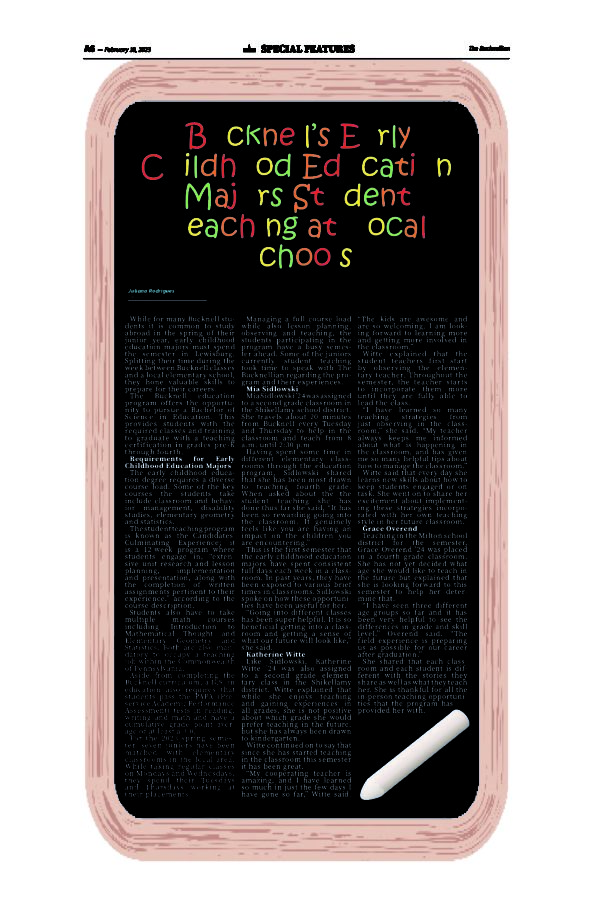Bucknell’s early childhood education majors student-teach at local schools
February 10, 2023
While for many Bucknell students it is common to study abroad in the spring of their junior year, early childhood education majors must spend the semester in Lewisburg. Splitting their time during the week between Bucknell classes and a local elementary school, they hone valuable skills to prepare for their careers.
The Bucknell education program offers the opportunity to pursue a Bachelor of Science in Education. This provides students with the required classes and training to graduate with a teaching certification in grades pre-K through fourth.
Requirements for Early Childhood Education Majors
The early childhood education degree requires a diverse course load. Some of the key courses the students take include classroom and behavior management, disability studies, elementary geometry and statistics.
The student teaching program is known as the Candidates’ Culminating Experience; it is a 12-week program where students engage in, “extensive unit research and lesson planning, implementation and presentation, along with the completion of written assignments pertinent to their experience,” according to the course description.
Students also have to take multiple math courses including Introduction to Mathematical Thought and Elementary Geometry and Statistics. Both are also mandatory to occupy a teaching job within the Commonwealth of Pennsylvania.
Aside from completing the Bucknell curriculum, a B.S. in education also requires that students pass the PAPA (Pre-service Academic Performance Assessment) tests in reading, writing and math and have a cumulative grade point average of at least a 3.0.
For the 2023 spring semester, seven juniors have been matched with elementary classrooms in the local area. While taking regular classes on Mondays and Wednesdays, they spend their Tuesdays and Thursdays working at their placements.
Managing a full course load while also lesson planning, observing and teaching, the students participating in the program have a busy semester ahead. Some of the juniors currently student teaching took time to speak with The Bucknellian regarding the program and their experiences.
Mia Sidlowski
Mia Sidlowski ’24 was assigned to a second grade classroom in the Shikellamy school district. She travels about 20 minutes from Bucknell every Tuesday and Thursday to help in the classroom and teach from 8 a.m. until 2:30 p.m.
Having spent some time in different elementary classrooms through the education program, Sidlowski shared that she has been most drawn to teaching fourth grade. When asked about the the student teaching she has done thus far she said, “It has been so rewarding going into the classroom. It genuinely feels like you are having an impact on the children you are encountering.”
This is the first semester that the early childhood education majors have spent consistent full days each week in a classroom. In past years, they have been exposed to various brief times in classrooms. Sidlowski spoke on how these opportunities have been useful for her.
“Going into different classes has been super helpful. It is so beneficial getting into a classroom and getting a sense of what our future will look like,” she said.
Katherine Witte
Like Sidlowski, Katherine Witte ’24 was also assigned to a second grade elementary class in the Shikellamy district. Witte explained that while she enjoys teaching and gaining experiences in all grades, she is not positive about which grade she would prefer teaching in the future, but she has always been drawn to kindergarten.
Witte continued on to say that since she has started teaching in the classroom this semester it has been great.
“My cooperating teacher is amazing, and I have learned so much in just the few days I have gone so far,” Witte said. “The kids are awesome and are so welcoming. I am looking forward to learning more and getting more involved in the classroom.”
Witte explained that the student teachers first start by observing the elementary teacher. Throughout the semester, the teacher starts to incorporate them more until they are fully able to lead the class.
“I have learned so many teaching strategies from just observing in the classroom,” she said. “My teacher always keeps me informed about what is happening in the classroom, and has given me so many helpful tips about how to manage the classroom.”
Witte said that every day she learns new skills about how to keep students engaged or on task. She went on to share her excitement about implementing these strategies incorporated with her own teaching style in her future classroom.
Grace Overend
Teaching in the Milton school district for the semester, Grace Overend ’24 was placed in a fourth grade classroom. She has not yet decided what age she would like to teach in the future but explained that she is looking forward to this semester to help her determine that.
“I have seen three different age groups so far and it has been very helpful to see the differences in grade and skill level,” Overend said. “The field experience is preparing us as possible for our career after graduation.”
She shared that each classroom and each student is different with the stories they share as well as what they teach her. She is thankful for all the in-person teaching opportunities that the program has provided her with.






















